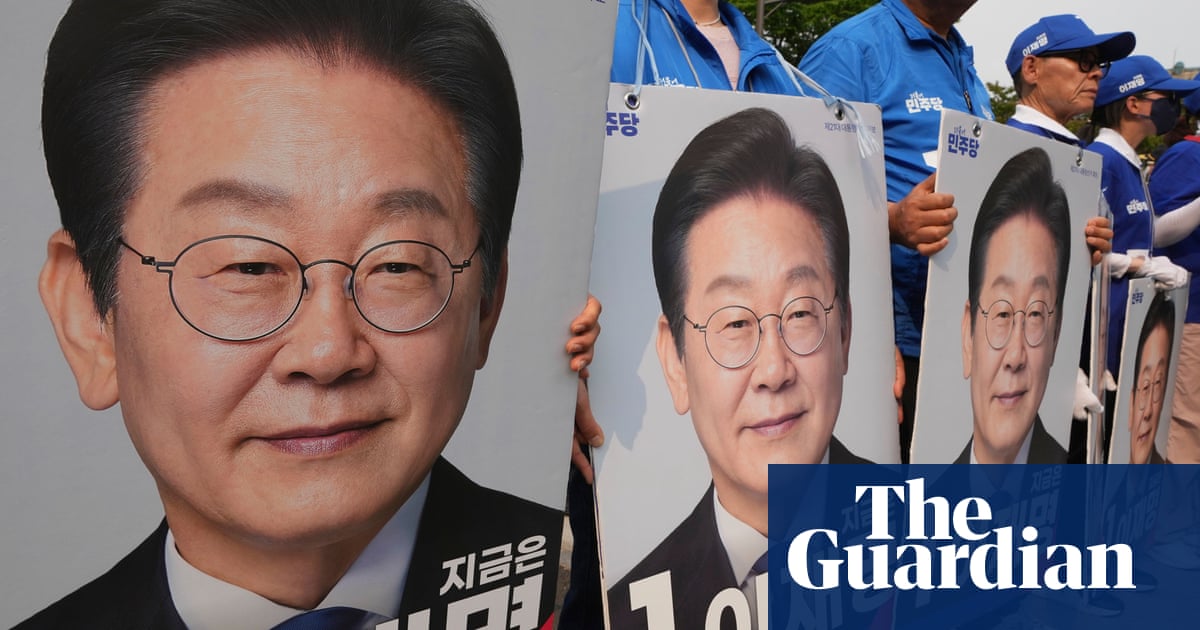The snipers positioned on Seoul rooftops scan the crowd through telescopic sights while counter-terrorism units patrol the perimeter with bomb-detection dogs. Bodyguards clutching ballistic briefcases form a protective ring.
On stage, Lee Jae-myung addresses thousands of supporters from behind bulletproof glass, protection that has become necessary after death threats and astabbing attack against him last year.
Yet at times the scene is closer to a celebration than a campaign rally shadowed by violence, as supporters break into spontaneous dance routines between speeches, while waving balloons and chanting.
The striking contrast reflects how deeply South Korea has fractured, but also the determination to heal those divisions, as the nationprepares for a presidential electionon 3 June,exactly six monthsafter former presidentYoon Suk Yeolattempted to impose martial law, plunging the nation into its gravest constitutional crisis in decades.
Lee, the Democratic party frontrunner whose continuous vilification by conservatives once made him unpalatable to moderate voters, is now gaining support from members of that same group who see him as the path back to political normalcy.
“Through the insurrection, the People Power party (PPP) betrayed the state and the people,” says Kim Sang-wook, a conservative MP who dramatically defected from Yoon’s conservative party to join Lee’s Democrats in May.
His transformation from party loyalist to opponent reflects a broader pattern of conservative defections that has left the ruling PPP institutionally weakened.
This conservative migration reflects what observers describe as an institutional crisis rather than mere electoral opportunism. According to Hankyoreh polling data, only 55% of Yoon’s 2022 voters now support conservative candidate Kim Moon-soo, with nearly half having defected or remaining undecided.
“The People Power Party must disappear quickly,” says Jeong Kyu-jae, a prominent conservative commentator. “Only when it collapses quickly can proper conservatism stand.”
The PPP’s current crisis stems in part from its steadfast defence of Yoon throughout the martial law episode and opposition to his impeachment. Despite belated apologies and forcing Yoon to “voluntarily” leave the party, it cannot escape his shadow: Yoon endorsed Kim Moon-soo, highlighting the toxic association that makes credible renewal nearly impossible.
Choi Sang-hwa, a former official under Park Geun-hye,the conservative president impeached for corruption in 2017, also joined the Democratic party this month, alongside multiple Park Geun-hye supporter groups and conservative organisations that have publicly backed Lee.
Lee has capitalised on this conservative political homelessness through a strategic pivot, declaring that the Democratic party is “originally centre-right, not progressive” while courting what his campaign calls “rational conservatives” and branding the People Power party as a “far-right criminal organisation.”
His appeal to conservatives centres on economic pragmatism rather than ideology: promises of business-friendly policies, inheritance tax reforms, and massive AI investment while carefully avoiding divisive social issues that might alienate traditional voters. For many, he simply represents the clearest rejection of martial law and Yoon’s legacy.
Domestic economic stagnation and shifting international dynamics have created an urgency around productivity and growth over redistribution, says Jeong Kyu-jae. “So riding on that wind, Lee naturally moves rightward.”
The Democratic Party’s signature blue on campaign posters and Lee’s jacket, necktie and footwear now combines with hints of conservative red, a deliberate metaphor for his courtship of disaffected conservatives.
The strategy appears to be working. In their final opinion poll before a pre-election blackout period, Gallup Korea showed Lee maintaining a commanding 49% to Kim’s 35%, with Lee Jun-seok, leader of the smaller conservative New Reform party, at 11%. Realmeter’s final poll echoed this trend, with Lee at 49.2% and Kim at 36.8%.
This realignment may also prove easier in South Korea, where political divisions oftencentre moreon opinions on North Korea, regional loyalties and leadership personalities than on western-style ideological orthodoxies.
Yet Lee’s path to the presidency remains shadowed by legal uncertainties. He faces multiple criminal trials, including charges of bribery and alleged involvement in a property development scandal, with South Korea’s supreme court recently ordering a retrial of an election violation case after overturning his acquittal, with instructions for conviction.
Courts have agreed to postpone further hearings of ongoing trials until after the election, allowing him to contest the presidency while the cases remain unresolved. Lee denies all charges, describing them as politically motivated persecution.
Should he win though, legal questions remain over whether presidential immunity would halt his ongoing prosecutions, as opposed to simply preventing new charges, potentially setting up another constitutional crisis.
Kim Moon-soo, meanwhile, has been trying to distance himself from well-documented ties to far-right elements, including his co-founding of a political party with the notorious pastor Jeon Kwang-hoon, an extremist preacher known for inflammatory rhetoric and who has defended Yoon’s martial law.
Kim’s own past statements, including his claim that “homosexuality is much more harmful than smoking cigarettes”, illustrate the challenge facing conservatives trying to broaden their appeal beyond their traditional base.
“Lee Jae-myung is someone who can integrate both conservative and progressive functions with an open mind,” says Kim Sang-wook. The candidate’s trajectory from an impoverished child factory worker to governor of Gyeonggi, South Korea’s most populous province, resonates with voters who prioritise stability over ideological purity, particularly as economic hardships mount, he says.
For Sangchin Chun, a professor of sociology at Sogang University, this election represents “the confrontation between those who support democracy and those who deny it.”
Whether Lee’s pivot proves enduring or merely reflects crisis-driven pragmatism remains uncertain. But as South Koreans head to the polls still scarred by their encounter with authoritarianism, his message offers a hopefully different path.
“The extreme form of seeing opponents as enemies was the martial law declaration to ‘sweep away’ the opposition,” Lee told the Guardian on the sidelines of Tuesday’s final televised debate.
“But whether someone supports me, opposes me, or is indifferent, I will respect them equally as citizens of the Republic of Korea.”
